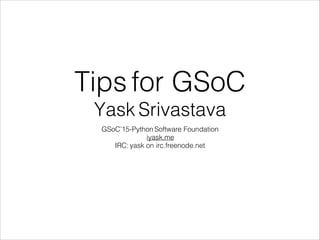
Tips for Getting Started with Open Source Software Development
- 1. ! Tips for GSoC Yask Srivastava GSoC’15-Python Software Foundation iyask.me IRC: yask on irc.freenode.net
- 2. About me • Creator of InstantMusic. • InstantMusic trended at #1 spot on HackerNews and received over 900 stars on Github. • Google Summer Of Code'15 , Python Software Foundation. • Season of KDE' 15 • Open source advocate, contributed to various organisations such as Mozilla, KDE, Moin Moin Wiki Engine. • Co-Founder of JEEQuery, a QnA web app that helps students prepare for IIT- JEE. • Worked @Routofy, @Grofers, @Zomato. Will be interning @Flipkart this summer.
- 3. I often compare open source to science. To where science took this whole notion of developing ideas in the open and improving on other peoples' ideas and making it into what science is today and the incredible advances that we have had. And I compare that to witchcraft and alchemy, where openness was something you didn't do. —-Linus Torvalds
- 4. What is Open Source ? Open source software is software whose source code is available for modification or enhancement by anyone. "Source code" is the part of software that most computer users don't ever see; it's the code computer programmers can manipulate to change how a piece of software—a "program" or "application"—works.
- 5. But, what in the world is open-source? It’s a question most of us foster for quite a few of our initial months here. If you haven’t heard of Open Source software …, wait that can’t be, you must have heard and probably used Software with it’s roots in open source. Firefox, Android, Chrome, LibreOffice, VLC all these giants are open source or derivative of wildly popular open source software. Free and Open source software is software, for which the source code or “recipe” is freely available. This means that anyone can download it, modify it and share it! But fret not! The saga has just begun! The world of open-source brings with it not only free, accessible, modifiable code, but a community of developers, a whole host of coding styles, and people from around the globe who work together to improve software and code as a community.
- 8. Because its inspiring! • People contribute not for money, but because of passion.
- 9. Passion for writing opensource projects • http://iyask.me/#projects
- 10. Passion to learn new things
- 11. Use *nix O.S # /bin/bash
- 12. Use FOSS And if you find bug, report it in it’s issue tracker.
- 13. Just contribute for passion Doesn’t matter which organisation
- 14. Where do I find projects? ! https://openhatch.org https://github.com/explore http://sourceforge.net/p/forge/helpwanted/ http://teachingopensource.org/ https:/
- 15. Start small This is not the last time I am going to say this.
- 16. “Steps” ! #1 Seek/Find/Reach out notice itch find code (eyeball community) ! Do your thing fork, clone poke around code (grep, code, etc) commit, push (to your version) ! Send back your work pull-request (comment/email)
- 17. Well known projects have: serious, dedicated, committed, professional people working on them.
- 20. • http://scikit-learn.org/stable/about.html • Your proposal should show that you've done your research. For example, this is my proposal for PSF: (Show the website) • Here's another proposal by a friend: https://github.com/sympy/sympy/wiki/ GSoC-2014-Application-Sushant-Hiray:-Extending-Elementary-Functions- CSymPy
- 21. • All of these have a clear cut proposal with links to existing code and an understanding of what steps should be taken. • Idea of a "proposed timeline" or "schedule of deliverables" section (PSF proposals have to use a template, and this is one of the sections). This lets you understand the project in depth, and also gives you a chance to show off what you know about it. If your org doesn't have a template for you to use, I highly suggest you include such a section, and spend time on it.
- 22. Communication is the “key” A cliché 95% human problems are caused by ... ... and are solved by.
- 23. Developers love it when you talk about the stuff they have written They are not annoyed by your questions.
- 24. Contribute as much as you can To the particular organisation you are interested in, which is going to take part in GSoC
- 25. How FOSS is different (Stable/Working) > (your ego) ! Expect to get Rejection but playful, friendly, caring rejection. Aspiring to Concensus-Based Perfection (rather than minimum viable product)
- 26. Learn to take "feedback" (ie criticism) Accepting criticism is actually a skill. YOU ARE NOT YOUR CODE. Development is a continuum.
- 27. DROP YOUR EGO! It’s just not cool here.
- 28. DON’T GET DISHEARTENED All mistakes will eventually be washed clean by time and entropy. Nobody cares how many times you fall down, ONE fewer than the times you get up all that matters
- 29. Thanks! Good luck for GSoC'16